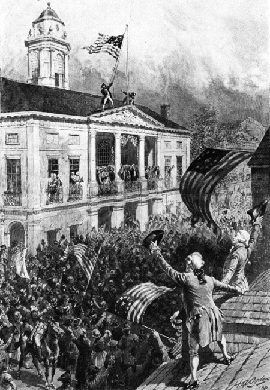April 30: George Washington Inaugurated
George Washington Inaugurated (1789)
It was on this date, April 30, 1789, that George Washington was inaugurated as the first President of the United States. In his inaugural address to the Senate and House of Representatives, Washington stressed,
The preservation of the sacred fire of liberty, and the destiny of the Republican model of Government, are justly considered as deeply, perhaps as finally staked, on the experiment entrusted to the hands of the American people.
It is significant, in light of those who would argue that the US was conceived as a Christian nation, that Washington made many euphemistic references to God in his address, but never — in this address, or in any of his writings — does he make direct reference to Jesus Christ. Indeed, we may never know if Washington was a Christian at all!
Washington's beliefs before his political and military career, and after his retirement, are discussed elsewhere. While Washington was commanding in the Revolutionary War, and during his Presidency (from 1789-1797), he did attend church, but this was only to be expected of a public man to whom all looked and on whom many hopes depended. But attendance proves nothing; was Washington a communicant? Every contemporary who knew of his church habits agrees that Washington was never seen to accept communion, and indeed, his wife wrote that he left the church on the occasions when communion was offered. When one pastor had the effrontery to remark on this publicly, Washington declined those occasions altogether.
Well, then, was Washington a praying man? Was he ever seen on his knees in prayer, as he is depicted in paintings and medallions commemorating the bitter winter of 1777-1778 at Valley Forge? That story first appears in the "Rev." Weems' Life of Washington, published in 1800. Weems, you may recall, was the one who invented the cherry tree story and other legends to make a demigod of Washington. The only witness said to have seen Washington at prayer on the frozen ground — alone and without the general's knowledge — was a local Quaker named Isaac Potts. But Potts himself never wrote down the account and, land records show, did not live at Valley Forge until after the war. Still, one Rev. Nathaniel Randolph Snowden says he got the story from Potts himself — but produces no other evidence beyond his hearsay.
As president, Washington addressed religion with the tolerance we would expect from the leader of a religiously diverse nation. In answer to a congregation that objected to the "godless" US Constitution, Washington wrote,
The path of true piety is so plain as to require but little political direction.... In the progress of morality and science, to which our government will give every furtherance, we may confidently expect the advancement of true religion and the completion of our happiness.
Without defining true piety and true religion, Washington seemed to follow the course of an anecdote related of Sir Anthony Ashley Cooper of the preceding century. Cooper, in speaking of religion, said, "People differ in their discourse and profession about these matters, but men of sense are really but of one religion." To the inquiry of "What religion?" the Earl said, "Men of sense never tell it." And neither did George Washington.
Originally published April 2003 by Ronald Bruce Meyer.


